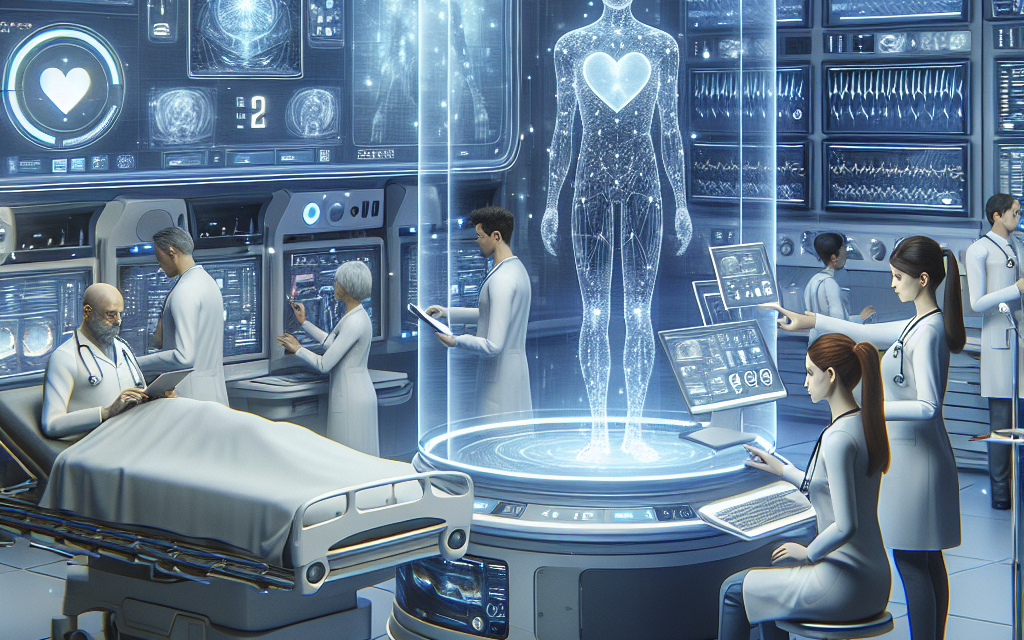HIMSSCast: The Future of Clinical Informatics and Decision Support

In the rapidly evolving landscape of healthcare, clinical informatics and decision support systems are at the forefront of transforming patient care. The Healthcare Information and Management Systems Society (HIMSS) has been a pivotal player in this transformation, providing a platform for discussions, innovations, and advancements in healthcare technology. This article delves into the future of clinical informatics and decision support, exploring key trends, challenges, and opportunities that lie ahead.
The Evolution of Clinical Informatics
Clinical informatics has undergone significant changes over the past few decades. From the early days of electronic health records (EHRs) to the current era of big data and artificial intelligence (AI), the field has continuously adapted to meet the needs of healthcare providers and patients.
Historical Context and Development
The journey of clinical informatics began with the digitization of patient records. In the 1960s and 1970s, hospitals started experimenting with computerized systems to manage patient data. These early systems were rudimentary, focusing primarily on administrative tasks rather than clinical decision-making.
By the 1990s, the introduction of EHRs marked a significant milestone. EHRs provided a comprehensive digital record of a patient’s medical history, facilitating better coordination of care. However, the adoption of EHRs was slow due to high costs and resistance from healthcare professionals who were accustomed to paper records.
In the 21st century, the landscape of clinical informatics has been reshaped by technological advancements. The integration of AI and machine learning into healthcare systems has opened new possibilities for data analysis and decision support. These technologies enable healthcare providers to analyze vast amounts of data quickly, leading to more accurate diagnoses and personalized treatment plans.
Current Trends in Clinical Informatics
Today, clinical informatics is characterized by several key trends that are shaping its future. One of the most significant trends is the shift towards patient-centered care. Healthcare providers are increasingly using informatics tools to engage patients in their own care, empowering them to make informed decisions about their health.
Another trend is the growing emphasis on interoperability. As healthcare systems become more complex, the ability to share data seamlessly across different platforms is crucial. Interoperability ensures that healthcare providers have access to complete and accurate patient information, reducing the risk of errors and improving patient outcomes.
Additionally, the rise of telemedicine and remote monitoring has expanded the scope of clinical informatics. These technologies allow healthcare providers to monitor patients’ health in real-time, regardless of their location. This is particularly beneficial for managing chronic conditions and providing care to patients in remote areas.
Challenges in Clinical Informatics
Despite the advancements in clinical informatics, several challenges remain. One of the primary challenges is data security and privacy. With the increasing digitization of healthcare data, the risk of cyberattacks and data breaches has also risen. Healthcare organizations must implement robust security measures to protect patient information and maintain trust.
Another challenge is the integration of new technologies into existing healthcare systems. Many healthcare providers are hesitant to adopt new technologies due to concerns about cost, complexity, and disruption to workflows. Overcoming these barriers requires a strategic approach that involves training, support, and collaboration between technology providers and healthcare organizations.
Furthermore, there is a need for standardized data formats and protocols to ensure interoperability. The lack of standardization can lead to data silos, where information is trapped within specific systems and cannot be easily accessed or shared. Efforts to develop and implement industry-wide standards are essential for the future of clinical informatics.
Opportunities for Innovation
Despite the challenges, the future of clinical informatics holds immense potential for innovation. One area of opportunity is the use of predictive analytics to improve patient outcomes. By analyzing historical data, healthcare providers can identify patterns and trends that may indicate potential health issues. This allows for early intervention and preventive care, reducing the risk of complications and hospitalizations.
Another promising area is the integration of genomics into clinical informatics. Advances in genetic research have made it possible to tailor treatments to an individual’s genetic makeup. This personalized approach to medicine has the potential to revolutionize patient care, offering more effective and targeted therapies.
Moreover, the development of smart devices and wearable technology is expanding the capabilities of clinical informatics. These devices can collect real-time data on a patient’s health, providing valuable insights into their condition and enabling timely interventions. As technology continues to evolve, the possibilities for innovation in clinical informatics are limitless.
Case Studies and Success Stories
Several healthcare organizations have successfully implemented clinical informatics solutions to improve patient care. For example, the Mayo Clinic has developed an AI-powered decision support system that assists physicians in diagnosing complex medical conditions. This system analyzes patient data and provides recommendations based on the latest medical research, enhancing the accuracy and efficiency of diagnoses.
Another success story is the Cleveland Clinic, which has integrated telemedicine into its clinical informatics strategy. By offering virtual consultations and remote monitoring, the clinic has expanded access to care and improved patient satisfaction. This approach has been particularly beneficial during the COVID-19 pandemic, allowing patients to receive care without the risk of exposure to the virus.
These case studies demonstrate the transformative impact of clinical informatics on healthcare delivery. By leveraging technology and data, healthcare organizations can enhance the quality of care, improve patient outcomes, and reduce costs.
The Role of Decision Support Systems in Healthcare
Decision support systems (DSS) are integral to the future of clinical informatics. These systems provide healthcare providers with the information and tools they need to make informed decisions about patient care. By analyzing data and generating evidence-based recommendations, DSS can improve the quality and efficiency of healthcare delivery.
Understanding Decision Support Systems
Decision support systems are computer-based tools that assist healthcare providers in making clinical decisions. These systems analyze data from various sources, such as EHRs, medical literature, and clinical guidelines, to generate recommendations for diagnosis, treatment, and management of patient conditions.
DSS can be classified into two main categories: knowledge-based and non-knowledge-based systems. Knowledge-based systems rely on a database of medical knowledge, such as clinical guidelines and best practices, to provide recommendations. Non-knowledge-based systems, on the other hand, use machine learning algorithms to analyze data and identify patterns that may indicate potential health issues.
The primary goal of DSS is to enhance the decision-making process by providing healthcare providers with relevant and timely information. This can lead to more accurate diagnoses, personalized treatment plans, and improved patient outcomes.
Benefits of Decision Support Systems
Decision support systems offer several benefits to healthcare providers and patients. One of the most significant benefits is the ability to improve the quality of care. By providing evidence-based recommendations, DSS can help healthcare providers make more informed decisions, reducing the risk of errors and improving patient outcomes.
Another benefit is the potential for cost savings. By optimizing the use of resources and reducing unnecessary tests and procedures, DSS can help healthcare organizations reduce costs and improve efficiency. This is particularly important in an era of rising healthcare costs and limited resources.
Additionally, DSS can enhance patient engagement and satisfaction. By involving patients in the decision-making process and providing them with personalized information about their health, DSS can empower patients to take an active role in their care. This can lead to better adherence to treatment plans and improved health outcomes.
Challenges in Implementing Decision Support Systems
Despite the benefits, implementing decision support systems in healthcare settings can be challenging. One of the primary challenges is the integration of DSS into existing workflows. Healthcare providers may be resistant to change, and there may be concerns about the impact of DSS on clinical autonomy and decision-making.
Another challenge is the quality and accuracy of the data used by DSS. Inaccurate or incomplete data can lead to incorrect recommendations, potentially compromising patient safety. Ensuring the quality and reliability of data is essential for the successful implementation of DSS.
Furthermore, there are concerns about the ethical implications of using DSS in healthcare. The use of AI and machine learning algorithms raises questions about transparency, accountability, and bias. Healthcare organizations must address these ethical considerations to ensure that DSS are used responsibly and ethically.
Opportunities for Advancing Decision Support Systems
Despite the challenges, there are several opportunities for advancing decision support systems in healthcare. One area of opportunity is the use of natural language processing (NLP) to analyze unstructured data, such as clinical notes and medical literature. NLP can extract valuable insights from this data, enhancing the capabilities of DSS and improving the accuracy of recommendations.
Another promising area is the integration of DSS with other healthcare technologies, such as telemedicine and remote monitoring. By combining these technologies, healthcare providers can access real-time data and make more informed decisions about patient care. This can lead to more timely interventions and improved patient outcomes.
Moreover, the development of personalized decision support systems has the potential to revolutionize patient care. By tailoring recommendations to an individual’s unique characteristics, such as their genetic makeup and medical history, personalized DSS can offer more effective and targeted therapies.
Case Studies and Success Stories
Several healthcare organizations have successfully implemented decision support systems to improve patient care. For example, Intermountain Healthcare has developed a DSS that assists physicians in managing patients with chronic conditions, such as diabetes and heart disease. This system analyzes patient data and provides recommendations for treatment and management, leading to improved patient outcomes and reduced hospitalizations.
Another success story is the University of Pittsburgh Medical Center, which has integrated a DSS into its EHR system. This system provides real-time alerts and recommendations to healthcare providers, enhancing the quality and efficiency of care. By leveraging DSS, the medical center has improved patient outcomes and reduced costs.
These case studies demonstrate the transformative impact of decision support systems on healthcare delivery. By providing healthcare providers with the information and tools they need to make informed decisions, DSS can enhance the quality of care, improve patient outcomes, and reduce costs.
The Impact of Artificial Intelligence on Clinical Informatics
Artificial intelligence (AI) is revolutionizing the field of clinical informatics, offering new possibilities for data analysis, decision support, and patient care. By leveraging AI technologies, healthcare providers can enhance the quality and efficiency of care, leading to improved patient outcomes.
Understanding Artificial Intelligence in Healthcare
Artificial intelligence refers to the use of computer algorithms to perform tasks that typically require human intelligence, such as data analysis, pattern recognition, and decision-making. In healthcare, AI technologies are used to analyze vast amounts of data, identify patterns and trends, and generate evidence-based recommendations for patient care.
AI can be classified into two main categories: narrow AI and general AI. Narrow AI refers to AI systems that are designed to perform specific tasks, such as image recognition or natural language processing. General AI, on the other hand, refers to AI systems that possess human-like intelligence and can perform a wide range of tasks. While general AI is still in the realm of science fiction, narrow AI is already being used in healthcare settings to improve patient care.
Applications of Artificial Intelligence in Clinical Informatics
Artificial intelligence has several applications in clinical informatics, ranging from data analysis to decision support. One of the most significant applications is the use of AI for predictive analytics. By analyzing historical data, AI algorithms can identify patterns and trends that may indicate potential health issues. This allows healthcare providers to intervene early and prevent complications, leading to improved patient outcomes.
Another application is the use of AI for image analysis. AI algorithms can analyze medical images, such as X-rays and MRIs, to identify abnormalities and assist in diagnosis. This can enhance the accuracy and efficiency of diagnoses, reducing the risk of errors and improving patient outcomes.
Additionally, AI can be used to enhance decision support systems. By analyzing data from various sources, AI algorithms can generate evidence-based recommendations for diagnosis, treatment, and management of patient conditions. This can improve the quality and efficiency of care, leading to better patient outcomes.
Challenges in Implementing Artificial Intelligence in Healthcare
Despite the potential benefits, implementing artificial intelligence in healthcare settings can be challenging. One of the primary challenges is the quality and accuracy of the data used by AI algorithms. Inaccurate or incomplete data can lead to incorrect recommendations, potentially compromising patient safety. Ensuring the quality and reliability of data is essential for the successful implementation of AI in healthcare.
Another challenge is the integration of AI technologies into existing healthcare systems. Healthcare providers may be resistant to change, and there may be concerns about the impact of AI on clinical autonomy and decision-making. Overcoming these barriers requires a strategic approach that involves training, support, and collaboration between technology providers and healthcare organizations.
Furthermore, there are concerns about the ethical implications of using AI in healthcare. The use of AI algorithms raises questions about transparency, accountability, and bias. Healthcare organizations must address these ethical considerations to ensure that AI is used responsibly and ethically.
Opportunities for Advancing Artificial Intelligence in Healthcare
Despite the challenges, there are several opportunities for advancing artificial intelligence in healthcare. One area of opportunity is the use of AI for personalized medicine. By analyzing an individual’s genetic makeup and medical history, AI algorithms can generate personalized treatment plans that are tailored to their unique characteristics. This personalized approach to medicine has the potential to revolutionize patient care, offering more effective and targeted therapies.
Another promising area is the use of AI for remote monitoring and telemedicine. By analyzing real-time data from wearable devices and remote monitoring systems, AI algorithms can provide healthcare providers with valuable insights into a patient’s condition. This can lead to more timely interventions and improved patient outcomes.
Moreover, the development of explainable AI has the potential to enhance the transparency and accountability of AI systems. Explainable AI refers to AI systems that provide clear and understandable explanations for their recommendations. This can enhance trust and confidence in AI technologies, leading to wider adoption in healthcare settings.
Case Studies and Success Stories
Several healthcare organizations have successfully implemented artificial intelligence technologies to improve patient care. For example, IBM Watson Health has developed an AI-powered decision support system that assists oncologists in diagnosing and treating cancer. This system analyzes patient data and provides recommendations based on the latest medical research, enhancing the accuracy and efficiency of cancer care.
Another success story is the use of AI for image analysis at Stanford University Medical Center. By leveraging AI algorithms, the medical center has improved the accuracy and efficiency of radiology diagnoses, reducing the risk of errors and improving patient outcomes.
These case studies demonstrate the transformative impact of artificial intelligence on healthcare delivery. By leveraging AI technologies, healthcare organizations can enhance the quality of care, improve patient outcomes, and reduce costs.
The Future of Clinical Informatics and Decision Support
The future of clinical informatics and decision support is bright, with several key trends and innovations shaping its trajectory. As technology continues to evolve, healthcare providers have the opportunity to leverage these advancements to improve patient care and outcomes.
Emerging Trends in Clinical Informatics
One of the most significant trends in clinical informatics is the shift towards precision medicine. Precision medicine involves tailoring medical treatment to an individual’s unique characteristics, such as their genetic makeup and medical history. By leveraging data from genomics, proteomics, and other sources, healthcare providers can develop personalized treatment plans that are more effective and targeted.
Another emerging trend is the use of blockchain technology for data security and interoperability. Blockchain offers a secure and transparent way to store and share healthcare data, reducing the risk of data breaches and ensuring that healthcare providers have access to complete and accurate patient information.
Additionally, the rise of digital health technologies, such as telemedicine and remote monitoring, is expanding the scope of clinical informatics. These technologies allow healthcare providers to monitor patients’ health in real-time, regardless of their location. This is particularly beneficial for managing chronic conditions and providing care to patients in remote areas.
Innovations in Decision Support Systems
The future of decision support systems is characterized by several key innovations. One area of innovation is the use of machine learning algorithms to enhance the capabilities of DSS. By analyzing vast amounts of data, machine learning algorithms can identify patterns and trends that may indicate potential health issues, leading to more accurate diagnoses and personalized treatment plans.
Another promising innovation is the development of voice-activated DSS. By leveraging natural language processing technologies, voice-activated DSS can provide healthcare providers with real-time recommendations and alerts, enhancing the quality and efficiency of care.
Moreover, the integration of DSS with other healthcare technologies, such as telemedicine and remote monitoring, has the potential to revolutionize patient care. By combining these technologies, healthcare providers can access real-time data and make more informed decisions about patient care.
Challenges and Opportunities for the Future
Despite the promising trends and innovations, several challenges remain for the future of clinical informatics and decision support. One of the primary challenges is data security and privacy. With the increasing digitization of healthcare data, the risk of cyberattacks and data breaches has also risen. Healthcare organizations must implement robust security measures to protect patient information and maintain trust.
Another challenge is the integration of new technologies into existing healthcare systems. Many healthcare providers are hesitant to adopt new technologies due to concerns about cost, complexity, and disruption to workflows. Overcoming these barriers requires a strategic approach that involves training, support, and collaboration between technology providers and healthcare organizations.
Despite these challenges, there are several opportunities for the future of clinical informatics and decision support. By leveraging emerging technologies and innovations, healthcare providers can enhance the quality of care, improve patient outcomes, and reduce costs.
Case Studies and Success Stories
Several healthcare organizations are leading the way in the future of clinical informatics and decision support. For example, Geisinger Health System has developed a precision medicine program that leverages genomics and other data sources to develop personalized treatment plans for patients. This program has led to improved patient outcomes and reduced costs.
Another success story is the use of blockchain technology for data security and interoperability at Mayo Clinic. By leveraging blockchain, the clinic has enhanced the security and transparency of its healthcare data, reducing the risk of data breaches and ensuring that healthcare providers have access to complete and accurate patient information.
These case studies demonstrate the transformative impact of clinical informatics and decision support on healthcare delivery. By leveraging technology and data, healthcare organizations can enhance the quality of care, improve patient outcomes, and reduce costs.
Conclusion: The Path Forward
The future of clinical informatics and decision support is filled with promise and potential. As technology continues to evolve, healthcare providers have the opportunity to leverage these advancements to improve patient care and outcomes. By embracing emerging trends and innovations, healthcare organizations can enhance the quality of care, improve patient outcomes, and reduce costs.
However, realizing this potential requires addressing several challenges, including data security and privacy, integration of new technologies, and ethical considerations. By implementing robust security measures, developing industry-wide standards, and addressing ethical concerns, healthcare organizations can ensure that clinical informatics and decision support are used responsibly and ethically.
Ultimately, the future of clinical informatics and decision support is bright, with several key trends and innovations shaping its trajectory. By leveraging these advancements, healthcare providers can enhance the quality of care, improve patient outcomes, and reduce costs, leading to a healthier and more sustainable future for all.





